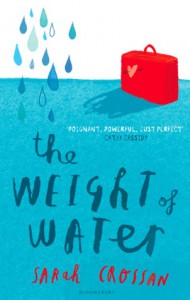

I need to finally brush off my prejudice against books that are written in verse. Every single time I raise a sceptical eyebrow in their direction - completely unable to believe that this is anything more than just lazy storytelling - and every single time I find myself impressed. [b:The Weight of Water|11409124|The Weight of Water|Sarah Crossan|http://d.gr-assets.com/books/1317905594s/11409124.jpg|16341936] was no exception. This is a delightful, if somewhat heartbreaking, little story that took me just over an hour to read.
I've noticed some people shelving this as "middle grade" and I understand why because the protagonist is young and it is an easy enough read for a younger audience to enjoy also. However, I feel the need to say something about this because I am usually put off by the "middle grade" label and sometimes assume it will lack depth or just be written in a style that is too young for me. Basically, I don't feel that is the case with [b:The Weight of Water|11409124|The Weight of Water|Sarah Crossan|http://d.gr-assets.com/books/1317905594s/11409124.jpg|16341936]. I find myself comparing it to books like [b:Wonder|11387515|Wonder|R.J. Palacio|http://d.gr-assets.com/books/1309285027s/11387515.jpg|16319487] - one which I did feel was a touch too young for me - and I think an older audience will appreciate the brutal honesty of this story. Nothing is sugar-coated, the story doesn't evolve through an ideal cycle of peace-problem-happyending. The issues are handled in a much more mature and realistic way.
The story is about Kasienka and her mother, two Polish migrants that have arrived in England searching for the father that left them. Kasienka's mother is obsessed with the idea that she can bring her husband back home to Poland if she can only talk things through with him. Kasienka, being the one with better English language skills, is made to walk down the streets of London, knocking on doors and asking whether people have seen her father. With every failed attempt to find her father, her mother's heart breaks a little bit more. But that is not the only problem Kasienka faces. She must deal with the other students at her school every day; students who hate her for being different, for wearing the wrong thing, for saying the wrong thing, or just because they can.
Swimming is just about the only thing Kasienka can do right; in the water, she is too much of a winner to be a loser. It's the one place she is untouchable. And while the idea of young teens turning to their passion to escape from reality has been explored to death, Kasienka's story still feels fresh. I think it is all the other things that make this story stand out from the crowd - Kasienka's relationship with her mother, the difficult choices she has to make at such a young age, and the exploration of the alienation that many immigrants face. For such a short book, I was blown away by how powerful and moving it was.
I only hope the author writes more novels in verse because I shall certainly be picking them up.

